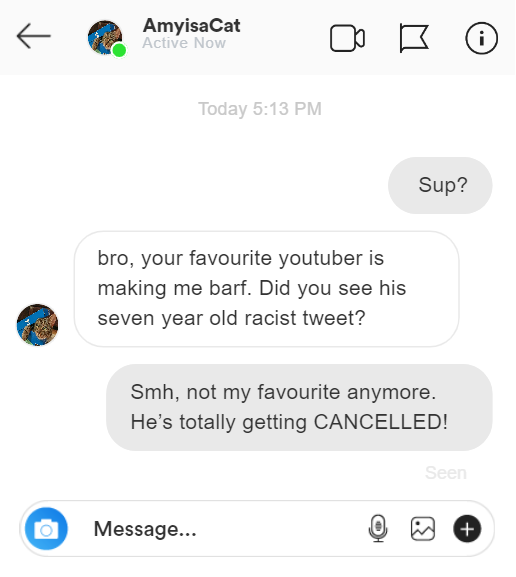[ kan-suhl kuhl-cher ]
Cancel culture refers to the common practice of withdrawing support to persons, usually public figures or organisations, after it is found that they have done or said something considered objectionable or offensive. Cancel culture is generally discussed as being performed on social media in the form of public shaming on a large scale.
Synonyms: online shaming, boycott.
Commonly practised through condemning the person in question on Instagram stories and tweets, accompanying phrases such as, “DISGUSTING!!!”, “I’m shook, ngl” and “People like these should NOT EXIST. PERIOD.” After gaining much attention, some cases also find themselves in the columns of major national and international dailies.
Not to be confused with a practice as simple as cancelling your Netflix subscription. At best, it could be considered close to cancelling your Netflix subscription and leaving it a bad review not just on Playstore but also on Twitter and other sites, if possible. Additionally, you can take it further and request others to post nasty reviews as well until its rating goes down to at least a 2 star.
Usage in text conversations or threads:

Why to cancel someone?
A widespread consensus has been observed for among the young internet users on the fact that if a person has had problematic opinions at any point of time, it is most likely that they still deserve to be exiled to the dark corners of the internet where they get no rays of views or validation. The best way to bring a positive change in such a person is to spot the limelight at them and shame them. This way, at least before they post their apology video on their feed, they will be overpowered by self-repulsion and hate and who knows, may be even compelled to think of their patterns? You have to take your chances here.
How to cancel someone?
There are mainly two ways in which you can participate in the very exciting and promising rage that is cancel culture:
(i) join existing cancel drives; or
(ii) start your down cancel drive.
Chances are that you’ve already been part of the former. It is an easy and convenient option, especially for those who are just warming up to this very cool trend of Social Media replacing physical courts and threads replacing tedious procedures like trials (whoever wants to go through that). Justice is better served sipping on your Cola in the comfort of your garden basking in the warmth of the Sun than arguing at length in dull courtrooms.
On most days, you can find such drives on the trending pages of your social media account or hashtags. From here, you can either simply share the posts further or even add your own views on the topic! Don’t worry, usually, you would not be expected to google the allegations or the basis of it. However, if your heart wouldn’t let you sleep at nights without doing your little research, you can try looking up for information on it on your favourite meme page whose side-hustle is coming across as woke. They would have most probably posted a compilation of about 2-5 slides titled “Why your favourite actor is problematic and should be cancelled now because he was transphobic fifteen years ago” or something along those lines. Pardon me, for I am not very good with titles but rest assured that they will do justice to it; condensing comprehensive vital information in 4:5 boxes is what they do on a daily basis.
Following up on the second option can be a little difficult and ideally would require you to have some prior clout. This is because you want to make sure that your cancel drive doesn’t die down. If it doesn’t reach your target’s circle and does not has an effect on their career and social opportunities, what is the point even? If you are aiming to cancel a person who’s way out of your circle, such as a famous singer, you might want to have some evidence with you. If you do not get dirt on them easily, try digging up a little because digital footprint is a real thing. If that doesn’t work, you can also try asking people online about any confrontations and arguments they might have had with this person in the past. Any sort of evidence, verified or not, will help. Chill, it’s not like we have a judge here, just have conviction. That way, things will work out like they always have for you.
Disclaimer
I know all of this might seem alluring but I have to give a fair disclaimer here: Frequent participation in cancel culture can brainwash you to be stuck in a monstrous and wicked pattern of behaviour where you would not even realise the disproportionate and excessive affects you may have on the target through being a part/initiator of such a drive. It can really mess with their life. You do not want to be the reason your target’s cat stops talking to them for a month, or the bakery guy in their neighbourhood gives them stink eyes, that’s ruthless. Hence, you should exercise discretion or you can be the next Maria to a Justin Bieber’s song.

Sarcasm [ˈsɑːkaz(ə)m]
noun
the use of irony to mock or convey contempt
usage in a sentence: Sarcasm, just like a netizen’s inherit responsibility, can sadly be misinterpreted
This post was written by Khushi, IInd year